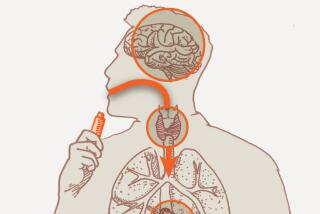Pot Takes a Hit in New Study of Health Dangers
- Share via
Smoking a single marijuana cigarette may be as damaging to a person’s health as smoking five tobacco cigarettes, according to a new study that supports a growing body of research suggesting that the drug may be more harmful than previously suspected.
The study, by researchers at the UCLA School of Medicine, found that marijuana smokers absorbed into the bloodstream nearly five times as much carbon monoxide and inhaled into their lungs three times as much tar as did tobacco smokers.
Noting that carbon monoxide has been linked to coronary artery disease and that tar has been associated with cancer, the researchers warned that smokers of a few marijuana cigarettes daily should be concerned about long-term damage.
“The bottom line is that smokers of just a couple of joints a day cannot lull themselves into a false sense of security that they will escape the pulmonary consequences of smoking just because they’re smoking so few joints,” said Dr. Donald P. Tashkin of UCLA.
The study appears in today’s issue of the New England Journal of Medicine.
The study is latest in a series of findings linking marijuana to a wide range of possible health consequences. They include problems in fetal development in pregnant women, impaired immune systems in test animals and changes in animals’ reproductive systems.
The new work also builds on earlier research in which Tashkin’s group found that smokers of three to four marijuana cigarettes a day suffered bronchitis and breathing-passage damage comparable to that experienced by tobacco smokers with one-pack-a-day habits.
Nevertheless, proponents of marijuana legalization on Wednesday questioned the purpose of tobacco-marijuana comparisons and suggested that marijuana smokers should heed Tashkin’s findings by using a water pipe as a filter.
“In the current climate, people are very skeptical about these reports about marijuana and health,” said Jon Gettman of the National Organization for the Reform of Marijuana Laws, adding that he feared that critics would use such studies to justify current bans on marijuana.
Tashkin said in an interview that the tar in marijuana smoke is insoluble in water so a water pipe would be an ineffective filter. He said a water filter would have only a minimal impact on the amount of carbon monoxide inhaled.
According to recent federal surveys, an estimated 22 million people in the United States smoke marijuana, 6 million of them on a daily basis. Federal officials say marijuana use has declined since 1979. Gettman disputes that contention.
Tashkin, a professor of medicine, studied 15 men who had smoked both marijuana and tobacco habitually for five years. He measured carbon monoxide in the blood and tar inhaled and deposited in the respiratory tract before and after smoking marijuana and tobacco.
The team traced the greater severity of the effects of marijuana to the filtration of tobacco cigarettes and to “smoking dynamics”--in particular, to the distinctive way in which marijuana cigarettes are smoked.
They found that the average volume of each puff was 70% larger and its duration 60% longer than the average puff of tobacco smoke. Cigarette smokers took more puffs but marijuana smokers inhaled more smoke. Their “smoke-retention time” was four times longer.
That deeper inhalation and longer retention time made possible greater intake of carbon monoxide by the blood, the researchers found. They traced the greater tar intake to smoking dynamics, and to the absence of filters and loosely packed quality of marijuana cigarettes.
Carbon monoxide, by interfering with the delivery of oxygen to the blood, heart and other tissues, has been linked to coronary artery disease, a prime cause of heart attacks. Tar, which contains carcinogens, is associated with an increased risk of cancer.
More to Read
Sign up for Essential California
The most important California stories and recommendations in your inbox every morning.
You may occasionally receive promotional content from the Los Angeles Times.













